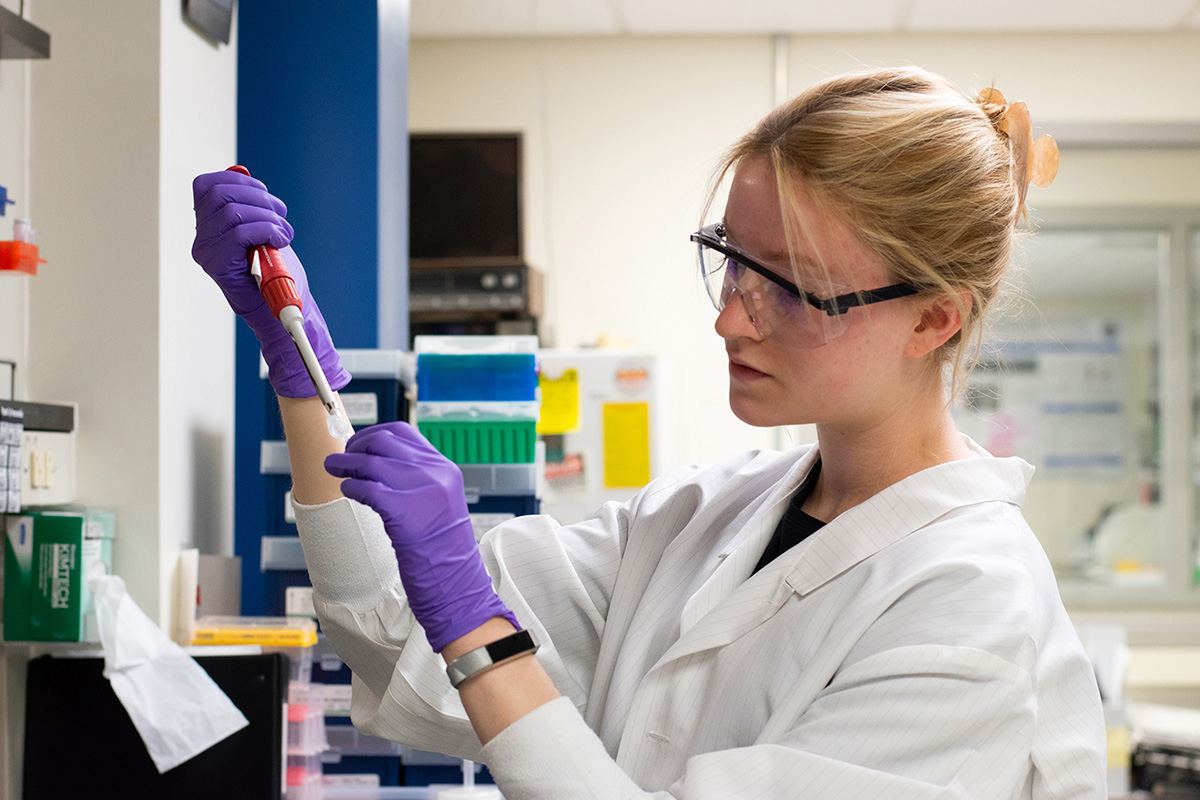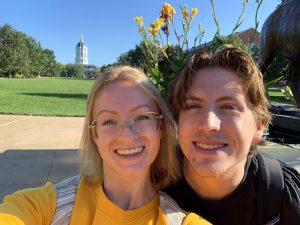
Story by Logan Jackson
Students pursuing the Honors certificate through the University of Missouri Honors College are part of an innovative and dynamic curriculum that encourages in-depth study in traditional fields of learning as well as additional intellectual inquiry.
For Sara Stiens, the Honors College also gave her a sense of belonging.
“I couldn’t imagine my college experience without the Honors College,” Stiens said. “The faculty and staff are fantastic, and they supported me not just as a student, but as a person. There are plenty of unique and exciting academic opportunities to pursue, and I made sure to take advantage of those. I quickly realized that the College was a place where I could make lasting friendships, too.
“The Honors College was my homebase throughout my time at MU. I found such an amazing community of people — who are family to me now – to share life with.”
Stiens, who is from the St. Louis, Missouri, area, had several ties to Mizzou before she officially stepped foot on campus as a Tiger. Her older brother studied music at MU and her family was on campus often to listen to him in concert. Stiens was also part of the Missouri Scholars Academy, a three-week residential program held each year for more than 300 of Missouri’s academically gifted students who are ready to begin their junior year of high school. The Academy is held each June at MU and administered by the Honors College.
“The Missouri Scholars Academy was a great opportunity for me to see more parts of campus and learn about the academic opportunities here, as well as meet numerous professors,” Stiens said. “What I also loved about the program is that it really changed my mindset related to studying and learning. Before, my primary goal of studying was to take in the content and get a good grade. I found out through the Missouri Scholars Academy that learning is a lifelong journey to be cherished. I really fell in love with learning and MU during my time in the program.”
While the Academy showed Stiens the opportunities available to her at Mizzou, the Mini-Medical School program, offered through the MU School of Medicine, helped her find a perfect degree program. The School invites Missouri high school students interested in careers in medicine an opportunity to preview what medical school is like.

“I had a really good conversation with one of the med students who was explaining this complicated pathway of a medication,” Stiens said. “I was fascinated with how much he knew about the molecular basis of this pathway and asked where he learned this information. He talked to me about the biochemistry degree program, and I realized that Mizzou was the place I needed to be, and biochemistry was the path I needed to follow.”
Stiens had always enjoyed science as a high school student and biochemistry allowed her to dive into the subject matter even deeper. It also connected her with research. Stiens was named a Discovery Fellow, a research-centric scholarship offered by the Honors College for incoming freshmen, and conducted research in a biochemistry laboratory during her first year.
“Research is near and dear to my heart,” Stiens said. “It has become a lifestyle for me.
“Biochemistry has been a special degree program for me as well. There have been so many great opportunities and it’s been amazing to build relationships with my professors, who have become mentors to me.”
As she found a deeper passion for research, especially projects centered on medicine, Stiens transitioned to a biomedical sciences focus. She has worked with Doug Bowles, professor and MU Department of Biomedical Sciences chair, for nearly three years.
“I really appreciate the amount of time Dr. Bowles has invested in helping me become a better scientist,” Stiens said. “We talk a lot about the science behind my research, but he also explains what it means to be a researcher. He’s trusted me with a lot and that’s been critical for my confidence.”
Stiens’ research focuses on a process called fibrosis, which describes the development of connective tissue in response to organ injury or damage. Also known as scarring, Stiens said fibrosis is caused by one primary mechanism.
“There is one cell type in every organ called a fibroblast,” Stiens said. “During the injury process, fibroblasts secrete proteins that form connective tissue, creating a scar. It’s a vital process; if you have organ damage and it leaves behind a hole, you need the scarring to help heal the organ. However, if you have too much scarring, your organ won’t be able to function as well.”
Stiens said that fibroblast cells work in a positive feedback mechanism, meaning when they begin the scarring process they sometimes don’t stop. Her research is looking at that action in the heart.
“We want to prevent these fibroblast cells from the continuous scarring process,” Stiens said. “To do that, you must understand the mechanisms at a cellular and molecular level. I take tissue cultures of fibroblast cells and study their disease state. I have been working to see if I can inhibit certain molecules that might be involved in the process. Specifically, I have been inhibiting these molecules called ion channels, which are on the outside of the cell and are responsible for a lot of cell signaling pathways.”
As Stiens looks toward the future, she said she is interested in finding a MD-PhD program where she can continue to do research as well as learn more about medicine. Stiens would like to eventually become a physician scientist where she can practice medicine and research the disease processes that she’s seeing as a clinician.
“Mizzou prepared me so well to be successful after graduation,” Stiens said. “I’ve had such a robust experience and been able to participate in a variety of hands-on learning opportunities. I’ve loved my experience here. Every day, I wake up and I’m excited to come to campus. I have so many fond memories that I will hold onto forever.”